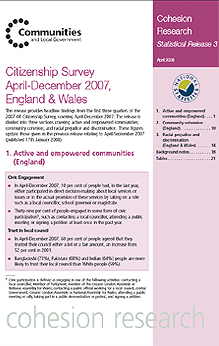
Publisher: Department of Communities & Local Government
Release Date: January 2008
Pages: 36
The Citizenship Survey is a face to face household survey carried out by a Government department – Communities and Local Government – covering a representative core sample of almost 10,000 adults in England and Wales each year, plus a minority ethnic boost sample of 5,000.
The most recent publication from this ongoing Survey reports on what respondents consider to be their most important values for living in Britain. ‘Respect for the law’ featured top for people in the White, Indian, Pakistani, Bangladeshi and Black African ethnic categories. Another value highly placed by all was ‘Tolerance and politeness towards others’: second most important for Whites, Pakistanis and Black Caribbeans.
In the case of Pakistanis and Bangladeshis (a good proxy for the Muslim population), ‘Respect for all faiths’ also featured prominently – tied with ‘Respect for the law’ as number one for the former, and as the second most important value for the latter.
For respondents in the Black Caribbean category, the most important value was ‘equality of opportunity’. ‘Respect for all faiths’ was not among the top five important values for people in the White category.
Of all the ethnic groups, white and minority ethnic, the value ‘Freedom to follow a religion of choice’ was most prized by Pakistanis – 35% – compared to 23% of Whites.
Amongst minority ethnic groups, Pakistanis are the most likely to think racial prejudice has worsened over the last five years. However those in the ‘Indian’ ethnic category are least likely to share this view. A reader of the Survey could therefore find supporting evidence for the ‘religious penalty’ which Muslims face in employment,over and above the ‘ethnic penalty’.
The value ‘Freedom to criticise the views and beliefs of others’ featured among the top five values in only 6% of Pakistani and Bangladeshi respondents, but amongst 21% of White respondents.
The Survey also highlights marked differences with respect to confidence in the political process. There is a level of detachment amongst Bangladeshis not shared with other ethnic categories. For example only 6% of Bangladeshis selected ‘Everyone has a voice in politics through democracy’ amongst their top five values. This general low expectation from political engagement may be reflected in poor levels of voter registration and turn-out on polling days.
